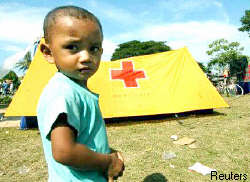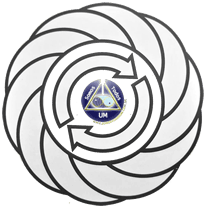What are 100 thousand lives, among billions?
 Publicado por Rosana Braga
em STUM WORLD
Publicado por Rosana Braga
em STUM WORLDCompartilhe
Translated by Luciana Soares Lopes - [email protected]
Definitely, I don't believe in simple chance and I don't believe we are a set of lives which purpose ends when our body loses its functions. That's why, since the tsunamis in Asia, I ask myself what means and how much a life is worth...
It’s inevitable questioning: why more than 100 thousand people simply lose their lives, like this, suddenly? Why they, these people, just these? It seems unfair, isn't it? But certainly not everything is what it seems!
I believe I can't have the slightest idea of the pain of those who stayed, who are, right now, suffering desperately for the loss of everything they built and, specially, for the "loss" of someone (one or the many ones) they loved...
Talking about loss, it seems strange to me, because I really believe that there wasn't loss in fact, but only a gap left that, before, was occupied by a body without, however, having left worth a life.
Then, thinking this way, what maybe hurts is not "death" itself - because in a certain way it doesn't even exist - but missing someone, the memories and the impression that the love felt for such people doesn't have the same influence, the same meaning.
Well... I know... we get used to the smell, the voice, the touch, the smile and even the faults of those we love... and when this person is not around, missing takes the control and all the senses that were previously filled by him/her... Here lies the sensation of non-existence, emptiness, insufficiency...
The other day, someone told me about a four-year-old little girl who, at the deathwatch of an aunt, asked her grandmother: "Grandma, what if aunt 'undies'? How is she going to get out of this box?" and I kept thinking about this verb: 'undie'!
What if we could ‘undie’? Everything - absolutely everything - would be different. The purpose of life would be other. Our mission and our time would be others. All the values and the procedures, truths and beliefs would be totally different...
Maybe, that’s exactly why we can't undie. We can only live "for a certain time somewhere and for some reason we do not know" and, after that, in the right moment, die. Being that dying is not the same as ‘unlive’ and living is not the same as ‘undie’. In life and in death, one is a follow-up of the other, we can't go back; at least not with the same mission, the same gift. We only have to go on, keeping the way and the sense which were granted to us.
Then, the same question comes back to me: how much is a life worth? How can we measure it? How can we quantify its value? What if we found a currency or a weighing machine to evaluate a life, a heart, a soul, a spirit, a smile, a tear, pain, missing, love... what would we do with the result? What difference does it make at this moment when we see the palpable ending?
Yes, because I quoted parts from someone we can't see. It's not possible to see the heart (metaphorically speaking), neither the soul or the spirit. Neither can we touch a smile or a tear as if they were static or lasted more than just a few moments... Then, we couldn't, however much we knew how to quantify them or attribute a specific value, turning them into palpable. They would keep on being ethereal, decaying and, at the same time, sublime and divine, eternalized by the power of love.
And I came to the conclusion that only love can make a life worth it. The more we love the more we are. And the more we love, the more we are loved. Our value is on how much we are loved and nothing else.
That's why, I come back to the title of this article to express what I feel before the desolation thousands and thousands of people are experiencing now all over the world... I'd say that, in a certain way, "however much unconscious it is" a desolation affects everyone, without difference: one hundred thousand lives, among so many billions of others, that are lost in such a circumstance, so unexplainable to us, are worth for the love of those who remained... are worth for the memories they left... they are worth for the smiles they caused, the happiness they provided. They are worth, above all, for what they are now because of what they were before...
And I, humbly, wish only to thank for the much they are worth it; not that they were not worth it (in the past), but for what they are (in the present). And may this measure be for us to restart, to rebuilt, to love more and more and to make each person's life worth it, the much it can be, even after each one of us to become - here in this dimension - only the love of those who remain...
| Consulte grátis | |||||
Leia Também
O que são 100 mil vidas, entre tantos bilhões de outras?
Sobre o autor
 | |
Acesse rosanabraga.com.br para mais conteúdos exclusivos!
Email: [email protected]
Visite o Site do Autor
Siga-nos:
NOSSO TRABALHO
Quem Somos
Nossa Missão
Colunistas
Cadastro Gratuito
Descadastramento
Depoimentos
Mapa do Site
Rss
Arquivo
Quem Somos
Nossa Missão
Colunistas
Cadastro Gratuito
Descadastramento
Depoimentos
Mapa do Site
Rss
Arquivo

© Copyright 2000-2025 SomosTodosUM - O SEU SITE DE AUTOCONHECIMENTO. Todos os direitos reservados.
Política de Privacidade - Site Parceiro do UOL Universa

